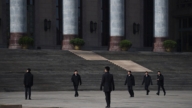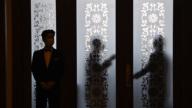【新唐人2014年07月16日訊】日前,美國「蘋果公司」對中共喉舌《央視》有關iPhone「常去地點」的「定位服務」功能,可能對「國家安全構成威脅」的質疑性報導,做出正式回應。「蘋果公司」在詳盡解釋了這一功能的同時,承諾保護所有用戶的隱私。「蘋果公司」還強調,從未向任何政府機構「開後門」獲取用戶數據,並且永遠不會。一起來看報導。
7月11號晚,中共喉舌《央視》指責智能手機iPhone的「常去地點」這個功能,會定位記錄用戶行跡,洩露用戶信息。並說,如果有人取得這些信息,可以了解中國的經濟狀態,甚至是國家機密,還建議民眾關閉相關功能。
之前,中共官媒也不斷指責「蘋果公司」向美國情報機構提供用戶信息。並且,要求給予「蘋果」「嚴厲處罰」等。
12號,針對《央視》指責iPhone的「常去地點」功能,是「潛在的國家安全威脅」,「蘋果」作出正式聲明並且回應說,「蘋果」的這項功能是根據客戶的要求所設定,功能本身「是在個人設備的級別上完成的,蘋果不會追蹤用戶的位置——蘋果從來沒有這樣做過,也從未有計劃要這樣做。」
聲明最後說:「蘋果」從來沒有與任何國家的任何政府機構來建立「開一個後門」,讓他們進入「蘋果」產品來獲取數據,「蘋果」永遠不會。
旅美中國社會問題研究人士張健:「作為蘋果這樣一個世界級別的公司,在第一時間回應,我相信蘋果所有的承諾是他蘋果的技術、蘋果人的道德品質的標準,完全可以達到的。談到後門的問題,礙於他(蘋果)在中國市場的這樣一個經濟利益,他無法把話講的很明。」
旅居美國的中國社會問題研究人士張健表示,非常重視中國市場的「蘋果公司」,用「開後門」這個雙關語,暗諷中共政府對內、對外,無所不用其極的偷取、勒索、盜用商業機密及個人信息。
全球最大互聯網媒體集團「CNET」(computer network)7月12號報導說,在過去幾年中,中國和美國的網絡戰一直是個公開的秘密。而「位置感知功能」早已被隱私倡導者所關注。
張健表示,廠商採用「收集數據」的反饋方式,會對未來產品更新起到一個重要性、關鍵性的指標作用,這是合情合理的。並且,所有國外的產品製造商,都會告知相關功能的用途,包括授權。而中共的所為則是別有用心。
張健:「中共在所有即時聊天都有一個安全的後門,像微信、QQ,包括微博都是以中共的喜好可以任意的封號,任意的封殺﹔中共加入這種安全後門之後,它就有能力、有針對性、有預謀、有組織的傳送木馬軟件,來盜取它所相關的機密的信息,這是對個人隱私嚴重的侵權行為。」
美國媒體分析說,《央視》的指責,是中共對美國科技公司發起最新的抵制。「CNET」也說,《央視》的報導,可能是為報復美國官方,日前曝光中國黑客入侵政府聯邦僱員的個人信息系統。
不過,張健認為中共打壓「蘋果」可能另有目地,因為「蘋果」有很多技術及功能令中共垂涎三尺。
「FaceTime」是「蘋果公司」的一種視訊通話應用軟體,不通過其他運營商,使用「蘋果」公司自訂的通信協議。
張健:「比如像國內很多維權的活動,包括法輪功,包括其他的宗教、地下教會,包括民運抗議,都可以通過FaceTime去傳播,這令中共也是非常非常的惱火,它也是想要在這個功能上得到蘋果的技術,進行屏蔽。」
張健表示,在擁有3G、4G網絡傳輸的國家,使用FaceTime的時候,由於流暢感強,隱秘性高,又沒有瀏覽痕跡,監控、監管難,令中共頭疼,因此對「蘋果」下手打壓。
採訪編輯/易如 後製/李勇
Apple Denies CCTV’s Allegation of Tracking And Using A Backdoor
Recently, Apple formally responded to the allegation reported
by CCP mouthpiece CCTV that the “frequent locations"
in iPhone’s “location Services" feature may “pose a threat
to national security."
In addition to the detailed explanation of this feature,
Apple promised to protect all of its users’ privacy.
Apple also stressed that it has never opened a “backdoor"
to any government agencies to access its users’ data,
and will never do so.
Let’s view the following reports.
On the evening of July 11, CCTV alleged that
the “frequent locations" iPhones feature can track
users’ locations, which will result in the disclosure
of users’ information.
It also reported that the information can expose
China’s economic situation and even state secrets.
As a result, it suggested that people
close the relevant functions.
Previously, the CCP official media repeatedly accused
Apple of providing its user information to U.S. intelligence
agencies, and called for “severe punishment" of Apple.
On July 12, Apple responded to CCTV’s allegation
that iPhones’ “frequent locations" feature is “a potential threat
to national Security."
Location data gathered by the phone is done so for
the users’ benefit, Apple said.
“We do this at the device level.
Apple does not track users’ locations –
Apple has never done so and has no plans to ever do so."
Finally, Apple indicated, “Apple has never worked with any
government agency from any country to create a backdoor
in any of our products or services." “We have also never
allowed access to our servers. And we never will."
Zhang Jian, a researcher of China social issues:
“As Apple is a world-class company, and responded
to the allegation so promptly, I believe that Apple will keep
its commitment based on its technology and moral standards.
As to the issues regarding backdoors, due to it (Apple)
having such economic interests in the Chinese market,
it was not made very clear."
Zhang Jian comments that as Apple attaches much importance
to the Chinese market, it uses the pun “backdoor" to satirize
the Communist government using all means to steal, extort
and misappropriate trade secrets and personal information
by all means at home and abroad.
On July 12, the world’s largest Internet media group CNET
(computer network) reported that in the past few years,
the cyber warfare between China and the U.S. has been
an open secret.
“Location awareness" has long been a concern
of privacy advocates.
Zhang Jian says that manufacturers adopted
the “data collection" feedback method because
it serves a crucial and key function
in the update of future products.
This is a sensible and reasonable approach.
Further, all overseas product manufacturers
will also provide notifications of the additional uses
of related functions as well as relevant authorization.
On the other hand, the CCP’s actions hide an ulterior motive.
Zhang Jian: “The CCP has a safety backdoor
in almost every instant messaging platform.
Platforms such as WeChat, QQ and Weibo can be shut down
and restricted at the CCP’s desire.
After the CCP participated in this safety backdoor program,
it gained the ability to spread Trojan software with precision,
premeditation and organization.
The Trojan software will hijack all related confidential
information.
This is a serious violation of privacy."
U.S. media analyzed that the CCTV accusations are
the CCP’s latest resistance to U.S. technology companies.
CNET also states that CCTV’s report may also be revenge
on U.S. officials for exposing Chinese hackers hacking into
the personal information system of federal government
employees recently.
However, Zhang Jian feels that CCP may have other motives
in suppressing Apple.
Its many technologies and functions are enticing to the CCP.
Facetime’is an Apple video-call application software.
It only uses the customized communication protocol
of Apple, and other operators are not involved.
Zhang Jian: “Many rights protection activities in Mainland
China, including Falun Gong, other religions,
underground churches, and pro-democracy protests,
can spread via Facetime.
This really makes the CCP very angry.
It is anxious to obtain Apple’s technology
on this feature, and then ban the activities."
Zhang Jian states that in a country with 3G or 4G networks,
Facetime has a strong sense of fluidity.
It is also highly secretive with no traces of browse history
which is a headache for the CCP to monitor and supervise.
Hence, it decided to suppress Apple.
Interview & Edit/YiRu Post-Production/LiYong


























